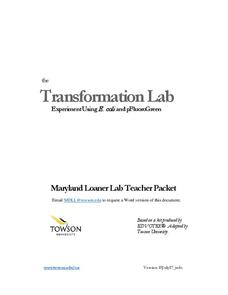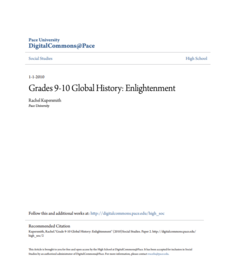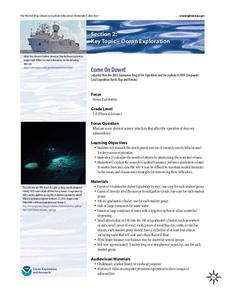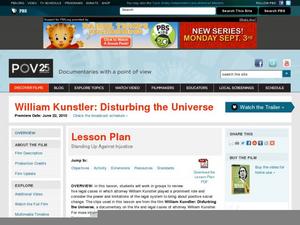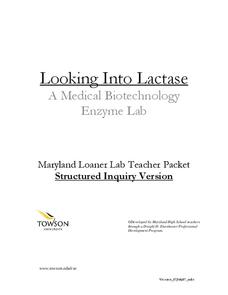Towson University
Transformation Lab
Transform your class' understanding of genes and antibiotic resistance with the Transformation Lab. Junior geneticists create and observe their own resistant strains of E. coli through research, discussion, and experimentation. The...
Howard Hughes Medical Institute
Lesson 3: Scientific Inquiry with WildCam Gorongosa
When biologists installed cameras in Gorongosa National Park, they ended up viewing a lot more than the lions they were trying to help! Young ecologists observe one of Africa's most beautiful savanna regions with interactive trail camera...
Pace University
The Iroquois
During the early 1500s, parts of modern-day New York were inhabited by Eastern Woodland Native Americans. To learn about the daily life, value, and traditions of these tribes, fourth graders research the Iroquois. Groups select projects...
iCivics
Lesson 2: Misinformation
Fake news is a hot topic right now ... but what is it? Intrepid young investigators track down the facts that separate journalistic mistakes and misinformation through reading, research, and discussion. Part three in a five-lesson series...
Curated OER
Daily Lesson Plan for the Struggling Writer and Speller
Special educators know that it isn't all about the lesson plan, but rather the strategies and practices you choose to use. Here are a set of research-based practices and tips you can use to inform your choices when teaching learners who...
Pace University
Global History: Enlightenment
The core ideas of the Enlightenment—reason, knowledge, and freedom—represented a rebellion against the despotic control of absolute monarchs. As part of the study of the movement, class members assume the voice or either a monarch or an...
NOAA
Come on Down!
What do we do when a dive is too dangerous for humans to accomplish? Send in the robots! Middle school scientists get acquainted with several different models of submersible robots in the second lesson of six from NOAA. Lab groups then...
US Institute of Peace
Nonverbal Communication
What is your body saying that maybe your words aren't? Scholars explore the vast world of the subtle, and not-so-subtle, nonverbal communication cues through group and individual work. Lesson seven in a series of peacebuilding exercises...
Curriculum Development Institute
Political and Social Development in the Early Period of the Republic of China
The 1911 Revolution marked the end of China's imperial dynasties. Individuals consider the issues at stake using cartoons, graphic organizers, and discussion exercises. They then consider what came next in China's history and whether the...
Curated OER
A Look Through My Antonia's Eyes
Thoroughly delve into My Antonia by Willa Cather with a plethora of activities. Engage scholars with videos and web sites in this week-long unit that explains the historical context and creates pioneers in the field of research. An...
Curated OER
The Legendary Raptors
How are raptors and airplanes alike? Combine science and language arts in this fun and interactive project. Young scientists research the animal in order to design their own aircraft, and compete in a contest for farthest, fastest, and...
West Virginia Department of Education
Intelligence of Authentic Character - News Coverage and John Brown's Raid
The resource, a standalone, shows how news coverage of John Brown's Raid began when the event happened and how that reporting shaped perception in West Virginia history. The resource includes interesting anticipatory discussion...
Curated OER
Monsters
Do monsters really exist? Find out what your class thinks with these discussion questions prior to reading Beowulf. Incorporate music and a video clip into the anticipatory set to engage your learners. Take a day to search online for...
National Museum of the American Indian
Lone Dog's Winter Count: Keeping History Alive
What is oral tradition, and what unique tool did the Native Americans of the Northern Great Plains use to help them remember their complex histories? Through pictograph analysis, discussion, research, and an engaging hands-on activity,...
PBS
Standing Up Against Injustice
“Sometimes things are lawful yet are actually wrong.” Researchers examine primary and secondary source materials as they study five legal cases involving civil rights attorney William Kunstler in which he attempted to use the legal...
American Physiological Society
Drug the Water Flea
This is a flea. This is a flea on drugs. Any questions? Your class will have questions aplenty during an impactful experiment. Lab groups get to know Daphnia magna, the humble water flea, and study the effects of stimulants and...
EngageNY
Close Reading of Bullfrog at Magnolia Circle: Main Ideas about the Bullfrog
As your class reaches the end of the book Bullfrog at Magnolia Circle, the seventh lesson plan in this literary unit helps third graders transition from reading narrative to expository writing. Scholars develop their note-taking skills...
EngageNY
Continued Close Reading of Bullfrog at Magnolia Circle: Text-Dependent Questions and Vivid Words and Phrases
In the third activity from this unit based on the book Bullfrog at Magnolia Circle, learners focus on using specific details from the text-to-answer questions about the habitat of bullfrogs. While reading the text, young scholars are...
Towson University
Looking Into Lactase: Structured Inquiry
Why is lactase important? Biology scholars explore enzyme function in a structured inquiry lab. The activity tasks lab groups with observing how temperature and pH affect enzyme activity, as well as determining which milk products...
Carolina K-12
Making First Vote Your Vote: Designing a Schoolwide Election
Encourage pupils to design an election plan for the entire school. They participate in a Board of Elections, create polling rules, discuss election controversies, write questions about the issues, run the election through an online...
California Department of Education
Name That Job!
Can you name the job that involves scholars, classes, and grades? If you guessed teacher, you just won a round of Name That Job! The second lesson in a five-part college and career readiness unit has career seekers team up and go head to...
Smithsonian Institution
Two Perspectives on the Battle of Little Bighorn/Greasy Grass
Learners understand why historians conduct research and the importance of perception when it comes to studying history. The resource covers The Wars of Expansion and the Battle of Little Bighorn/Greasy Grass through group work, debate,...
Curated OER
Cinderella
Explore positive and negative character traits and universal themes in the story of Cinderella with primary learners. Story elements are reviewed and discussion questions are listed. Learners practice retelling the story and begin a...
EngageNY
End of Unit 2 Assessment: Working with Two Texts - Reading, Listening, Summarizing, and Synthesizing
As a summative assessment for this unit on colonial trade, fourth graders listen to and read informational texts in order to demonstrate their ability to take notes, write summaries, and draw connections. Young scholars first listen as...
Other popular searches
- Internet Research Skills
- Library Research Study Skills
- Teaching Research Skills
- Basic Research Skills
- Teach Research Skills
- Research Skills Atlas
- Library Research Skills
- Practice Research Skills
- History Research Skills
- Assessing Research Skills
- Literacy Research Skills
- Reach Research Skills


